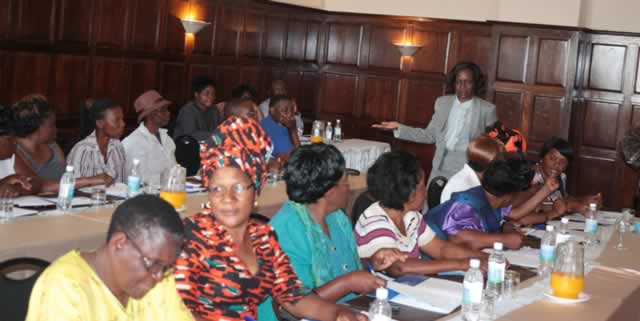Women should be part of the extractive industry development

Vaidah Mashangwa in Australia
TODAY’S article is a bid to share with readers the experiences being gained during the Mining and Gender Study Tour to South Africa and Australia sponsored by Australia-Africa Partnerships Facility (AAPF) from March 5-19, 2015.
The AAPF strives to promote gender equality and women empowerment in the extractive industry in Africa. Best practices in the mining sector were learnt from the participants drawn from Burkina Faso, Cameroon, Madagascar, Namibia, Nigeria, Senegal, South Africa, Tanzania, Zambia and Zimbabwe. African regional organisations present include the Common Market for Eastern and Southern Africa (Comesa) and Economic Community of West African states (Ecowas). The study tour coincided with the International Women’s Day 2015 commemorations.
The study tour seeks to introduce the basic governance and operational structures of the mining sector in South Africa and Australia, explore the gender impacts of mining, examine ways in which men and women are employed in the mining sector and to identify policies and approaches for improved recruitment, retention and leadership of women in the sector.
According to UN Women, the oil, gas, and mineral value chains have important opportunities and considerations for women engagement which are currently not fully realised. During the initial stages of impact assessment and consultation during exploration, efforts must be made to capture women’s needs and concerns and include them when disseminating the findings. According to Global Gender Gap Report, countries with greater gender equality have economies that are more competitive and grow faster as shown through research in 114 countries.
Various issues emerged such as the low representation of women in the mining labour force due to the industry’s gender stereotypes and traditional masculine image, lack of technical expertise, gender-biased recruitment and employment policies and restricted career development for women. Apart from that, mining operations present greater health risks and social concerns for women such as HIV/Aids, domestic violence, sexual abuse and harassment, alcoholism and prostitution.
One of the visits to Kriel Mine in South Africa revealed that they have started on a work-based programme on HIV/Aids for its employees. The mine workers and their dependants are tested for HIV/Aids and for those found positive, there is an ART programme. With the realisation that there are also killer diseases such as cancer, TB, hypertension and diabetes, employees and their dependants are also screened and assisted accordingly and this has assisted the organisation to have better retention rates. These are best practices which can be duplicated by African states especially those without such programmes.
The mine has also done a lot to ensure that land rehabilitation takes place at the mine. This is being done through planting maize, soya beans, bamboo trees, olive trees and breeding of owls to restore the eco-system. Most mines leave dongas and ditches open thereby causing danger to humans and animals.
Apart from that, the Anglo American-owned mine, has several women in senior management positions and some are hands-on underground. The mine is also involved in several community projects such as construction of schools, skills development, waste management, Maths and Science learner programme, skills development and they also provide scholarships to communities. The schools were visited and they have state-of-the-art class equipment, laboratories and libraries.
UN Women pointed out that Africa makes up between 40 and 100 percent of the workforce in the artisanal and small-scale mining operations. Women in this sector are involved in labour extensive activities and processes thereby exposing themselves to dangerous substances such as mercury. Apart from that, in most African states, women who work in bigger mines are cleaners, cooks, bookkeepers, clerks and so on while men are the engineers, artisans, general managers, geologists and human resource managers. This is so despite the affirmative action which has assisted girls and women to enter tertiary institutions with lower points than boys. Where are those girls and women who have completed studies in mine-related fields?
The Fly In Fly Out phenomenon in South Africa and Australia where mine workers work for say two weeks and fly back to their countries for a two-week break means men and women mine employees stay away from home for longer periods. This leaves the workers at a greater risk of contracting HIV/Aids and STIs from prostitutes around the mining sites. This also destroys family relations. At Kriel mine for example it emerged that extra-marital affairs was one of the reasons why the men contracted HIV/Aids.
Australia and some African states are making efforts to address gender imbalances in the mining sector and evolving gender challenges in the mining sector. In Australia about 15 percent of the workforce is female while in South Africa the Chamber of Mines estimates that only 6.9 percent of the local mining industry workers are female. The same scenario is true in most African states including Zimbabwe.
The Constitution of Zimbabwe Chapter 17 is solely dedicated to gender balance and it is high time such provisions are extended to all sectors of the economy such as agriculture, tourism and mining in terms of resource allocation, employment opportunities and governance.
Addressing all these challenges ensures growth in the economies around the world. A report by a World Bank group indicated that investment in women’s employment across all industries delivers benefits to both men and women and businesses, leading to enhanced productivity.
The study tour is particularly important as it gives the participants the opportunity to interact with men and women in managerial positions in the mining sector, indigenous groups, private sector companies and community groups and this ensures that participants have a vast understanding of the operations of mining companies.
Vaidah Mashangwa is the Provincial Development Officer for Bulawayo in the Ministry of Women Affairs, Gender and Community Development. She can be contacted on 0772 111 592, e-mail [email protected]









Comments